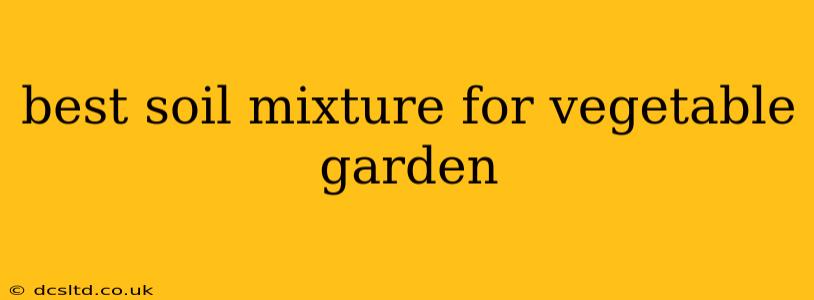Creating the perfect soil mixture for your vegetable garden is crucial for healthy growth and bountiful harvests. While the "best" mixture will depend on your specific climate, existing soil conditions, and the vegetables you plan to grow, a well-balanced blend typically incorporates several key components. This guide will delve into the optimal soil composition, addressing common questions gardeners have about achieving soil success.
What are the key ingredients of a good vegetable garden soil mix?
A successful vegetable garden soil mix usually contains a combination of:
-
Compost: This is the cornerstone of a healthy soil mix. Compost improves soil structure, drainage, aeration, and provides essential nutrients. Aim for a mature, well-rotted compost for best results. The darker the compost, the more decomposed and ready it is to use.
-
Topsoil: Provides a base for your soil blend and offers essential minerals. The quality of your topsoil varies greatly depending on your location. Testing your existing soil is a good first step to determining what nutrients you might need to supplement.
-
Perlite or Vermiculite: These inorganic materials improve drainage and aeration, preventing soil compaction and ensuring healthy root development. Perlite is a volcanic glass, while vermiculite is a mineral that expands when heated. Both offer excellent water retention properties.
-
Coarse Sand (Optional): For heavy clay soils, adding coarse sand can help improve drainage significantly. Avoid fine sand, as it can compact easily.
The ideal ratio often cited is a 1:1:1 mix of compost, topsoil, and perlite or vermiculite. However, adjustments may be necessary depending on your existing soil conditions.
How much compost should I add to my vegetable garden soil?
The amount of compost you should add depends on the quality of your existing soil. If you have poor, sandy, or clay soil, you'll likely need a higher percentage of compost (up to 50% or even more). If your soil is already fairly rich, you might only need 25-30% compost to enrich it further. It's always best to conduct a soil test to determine your soil's specific needs.
What is the best soil pH for vegetables?
Most vegetables thrive in a slightly acidic to neutral pH range, typically between 6.0 and 7.0. However, some vegetables have specific preferences. Regular soil testing will help you monitor the pH and adjust accordingly using lime (to raise pH) or sulfur (to lower pH).
Should I use peat moss in my vegetable garden soil mix?
While peat moss can improve soil structure and water retention, its use is increasingly questioned due to environmental concerns about its unsustainable harvesting. Consider alternatives such as coir (coconut fiber), which is a renewable resource and offers similar benefits.
What are the benefits of using a raised bed for vegetable gardening?
Raised beds offer several advantages:
- Improved Drainage: Excess water drains more easily, reducing the risk of root rot.
- Better Soil Control: You have complete control over the soil composition, ensuring optimal conditions for your vegetables.
- Easier Access: Raised beds make weeding and harvesting easier, particularly for those with mobility issues.
- Warmer Soil: Raised beds tend to warm up faster in the spring, allowing for an earlier planting season.
How do I improve my existing soil for vegetable gardening?
Before creating a new soil mixture, amend your existing soil. This involves adding organic matter like compost, aged manure, or leaf mold to improve its structure and nutrient content. Regular tilling and the addition of cover crops can also help enhance soil health over time. A soil test will provide invaluable insights into your soil's current condition and guide your amendments.
By understanding the key components and addressing your specific soil needs, you can create the ideal soil mixture for a thriving and productive vegetable garden. Remember to always conduct a soil test to determine your unique soil's requirements and adjust your soil mix accordingly. Happy gardening!
